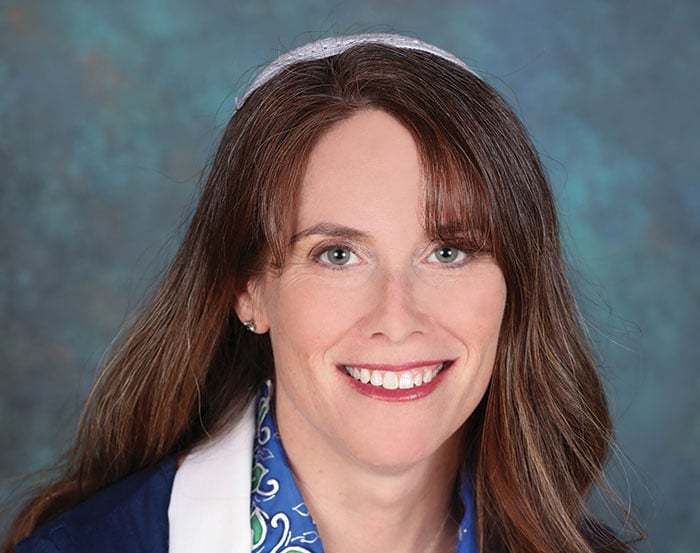
When Rabbi Sarah Hronsky was 15 and growing up in St. Louis, Missouri, she learned about tikkun olam and inclusivity from her rabbi, Rabbi Lynn Koshner. No matter who needed help, Koshner was there for them.
“We scouted out homeless people in abandoned train cars and fed them once a week,” said Hronsky, who is the senior rabbi at Temple Beth Hillel in Valley Village. “She showed me how to do acts of loving-kindness outside of the doors of the temple.”
The temple was small – everyone contributed and everyone participated. Hronsky’s parents served on the board and eventually she did, too.
“My mom and I mowed the temple yard and stacked the furniture so it could function,” she said. “I participated in the youth group.”
Hronsky’s love for synagogue life – along with Koshner’s influence – made her want to pursue the rabbinate.
“[Koshner] opened my eyes,” she said. “The previous rabbi taught me about Jewish study and how to lein Torah and read prayer. That was beautiful. Rabbi Koshner showed what it meant to be part of the larger Jewish community and serve folks who are in the ‘othered’ category.”
As a rabbinical student at Hebrew Union College-Jewish Institute of Religion, one of the focuses of Hronsky’s studies was how the Jewish tradition saw people with disabilities.
“For me, Judaism was about accessibility for everyone, and almost 20 years ago, there wasn’t a lot of knowledge about how to be inclusive of people who are differently abled,” she said. “Judaism may put you on the outside and not allow you to fully participate in the community. I wanted to study the origins of the stigma behind disabilities and make Judaism inclusive.”
At Temple Beth Hillel, where she’s been since 2003, she makes sure that everybody, no matter what their abilities, background or connection to Judaism are, can participate. For instance, every child has a bar or bat mitzvah based on their needs.
“Some kids will learn a little Torah, and some will learn a lot,” Hronsky said. “Some will read a lot of Hebrew, some won’t. Everyone is able to have a bar or bat mitzvah.”
Throughout the pandemic, Hronsky and her staff reached out congregants to ensure they were able to see the services. Mainly, they were helping senior citizens who didn’t know how to log onto services online.
“We were training them on how to install programs on their computer so they could access services,” she said. “We also did Zoom classes to reach people and create a holy space in their house.”
Recently, Hronsky and her congregation have also strengthened their relationships with Jews of color and clergy members of different faiths.
“We spent a year deeply committing to learning, reading books and having guest lecturers,” she said. “We see what’s happening in the world around us and how we can make a change and be part of this healing process.”
Hronsky learned about inclusivity and the value of caring for all different types of people from one of the Torah’s core teachings.
“We need to embrace each other as holy and truly treat one another in a way we wish to be treated.”
“I really want to live by the holiness code: love your neighbor and your stranger like yourself,” she said. “We need to embrace each other as holy and truly treat one another in a way we wish to be treated. Whether they are our neighbor or different from us, everyone should be treated with dignity.”
For Hronsky, this means that anybody who walks through the doors at Temple Beth Hillel is going to feel at home.
“One of our folks who knocked on the door spent the last couple of years studying and converting,” she said. “They were called up to the Torah just a week ago for an adult b’nai mitzvah. Our congregation was so excited to show up and support this individual on their journey.”
This is exactly what Hronsky envisioned when she first become involved in her childhood temple. Today, she’s proud she’s passed on inclusivity to her own congregation.
“We pride ourselves on being warm, welcoming and inclusive,” she said. “We’re embracing people for who they are.”
Fast Takes with Sarah Hronsky
Jewish Journal: What’s your favorite Shavuot food?
Sarah Hronsky: Cheese blintzes.
JJ: What would you be if you weren’t a rabbi?
SH: Probably a veterinarian. I kind of love all the gross medical stuff, and animals are lovely. And they don’t talk back.
JJ: What do you like to do with your family when you have some time off work?
SH: We love to do family traditions. Ride the ferris wheel in Santa Monica. Host meals. We might be at Disneyland or go hiking.
JJ: What’s your perfect Shabbat look like?
SH: A big, fun, festive service where kids can play, parents participate and there is eating and prayer and music.























 More news and opinions than at a Shabbat dinner, right in your inbox.
More news and opinions than at a Shabbat dinner, right in your inbox.